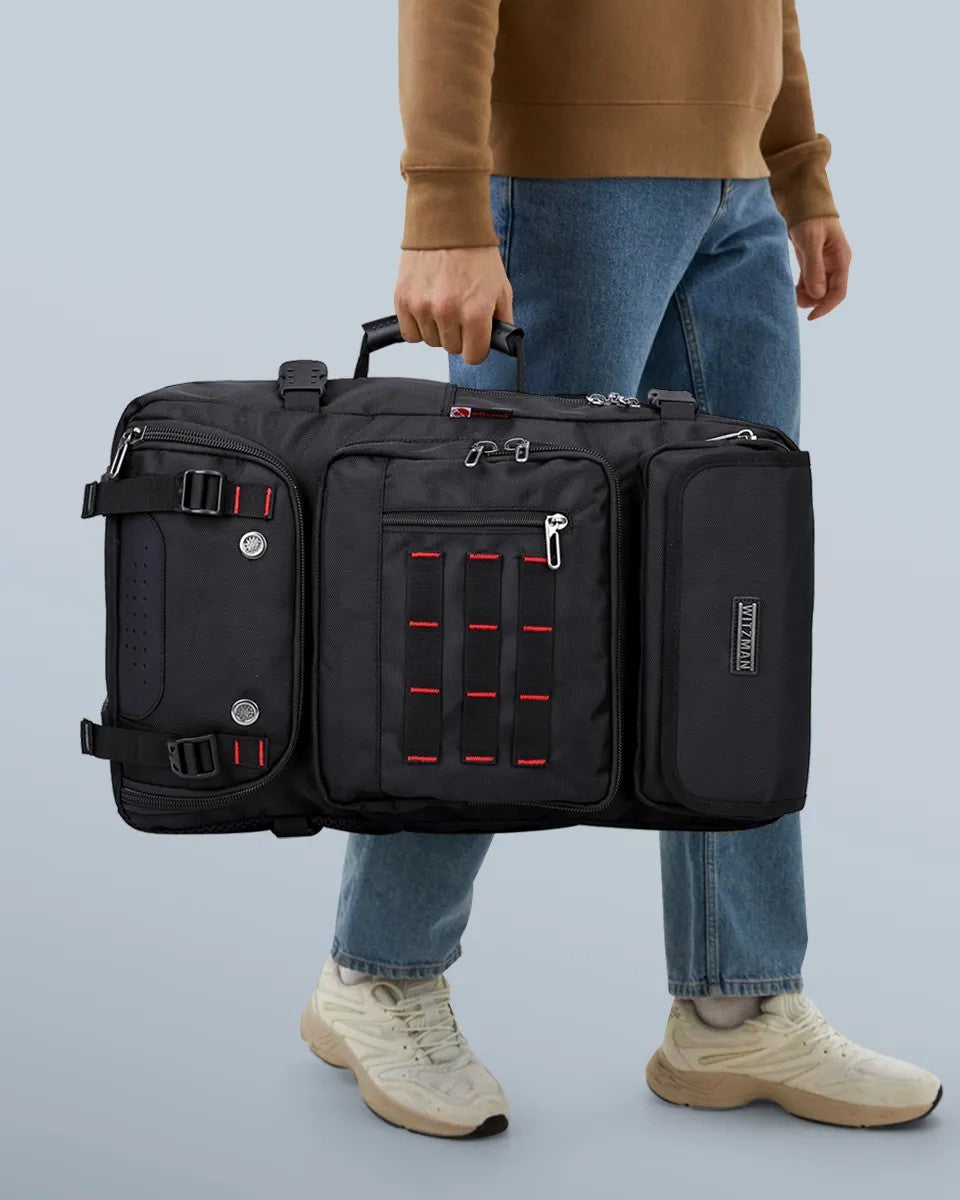Introduction
Traveling offers an incredible opportunity to explore new cultures, meet diverse people, and experience the world in a way that enriches the soul. However, with the thrill of adventure comes the responsibility of safeguarding your belongings, particularly your backpack, which often holds your most essential items. In recent years, the frequency of travel-related thefts has surged, making it more important than ever to be vigilant about securing your gear. Whether you’re backpacking through Europe, trekking in Southeast Asia, or simply commuting in a busy city, understanding how to protect your belongings is crucial.
Understanding Common Travel Threats
When it comes to travel safety, one of the most significant concerns is the risk of theft. In bustling cities and tourist hotspots, pickpocketing and bag snatching are prevalent, with thieves targeting unsuspecting travelers. For instance, in cities like Barcelona and Rome, pickpocketing has become an almost routine crime, with thousands of incidents reported annually. According to a study by the European Commission, over 6 million tourists fall victim to theft each year in Europe alone.
Beyond pickpocketing, travelers also face the threat of bag snatching. This often occurs in crowded areas or when travelers are distracted, making it easy for thieves to grab bags and disappear into the crowd. A news report from Bangkok in 2023 highlighted a series of incidents where motorbike-riding thieves targeted tourists, snatching bags and quickly fleeing the scene.
Another concern is unauthorized access to your luggage. This can happen in hotels, airports, or public transportation, where opportunistic thieves take advantage of the chaotic environment to tamper with your belongings. According to a survey by the International Air Transport Association (IATA), nearly 30% of travelers have experienced incidents where their luggage was opened or tampered with during transit.
Choosing the Right Backpack for Security
Selecting the right backpack is the first step in ensuring your belongings are secure. Today’s market offers a range of anti-theft backpacks designed to provide travelers with peace of mind. When choosing a backpack, it’s essential to consider features like lockable zippers, slash-proof materials, and RFID-blocking pockets.Or you can choose a backpack with a zipper equipped with a safety buckle, such as WITZMAN travel backpack

Lockable zippers are a must-have feature, preventing unauthorized access to your backpack’s contents. Some advanced backpacks even come with built-in combination locks for added security. For instance, the Pacsafe Venturesafe backpack features a patented eXomesh slashguard technology that reinforces the bag with stainless steel wire mesh, making it virtually impossible to cut through.
In addition to physical security features, consider the material of the backpack. Opt for a model made from high-quality, slash-proof fabric that can withstand attempts to cut through it. Nylon or polyester with reinforced stitching is ideal for this purpose.
Moreover, RFID-blocking pockets are becoming increasingly popular as they protect against digital theft. With the rise of contactless payment systems and digital identity cards, thieves have developed techniques to steal information from these cards remotely. RFID-blocking pockets prevent this by shielding your cards from unauthorized scans.

Packing Strategies for Enhanced Security
How you pack your backpack can significantly impact the security of your belongings. Smart packing techniques can help you distribute valuables, conceal important items, and minimize the risk of loss or theft.
One effective strategy is to use packing cubes and organizers. These not only keep your belongings neatly arranged but also add an extra layer of security. By dividing your items into separate compartments, you make it harder for thieves to quickly grab something valuable. Additionally, consider using hidden pockets within your backpack for your most important items, such as passports, money, and credit cards.
Another critical aspect of packing for security is to minimize the number of high-value items you carry. Keep expensive electronics, jewelry, and other valuables to a minimum, and instead, opt for more practical and replaceable items.
Digital security is also a concern when traveling. Ensure that any devices you carry, such as laptops or tablets, are password-protected and encrypted. Additionally, store sensitive information on secure cloud services rather than on the device itself, so you can remotely wipe the data if necessary.
Securing Your Backpack in Different Scenarios
Traveling often involves moving through various environments, each with its own set of security challenges. Whether you’re on public transportation, staying in accommodations, or exploring new places, adapting your security measures to the situation is essential.
When using public transportation, always keep your backpack close and in sight. In crowded buses or trains, wear your backpack on your front, where you can see it. Alternatively, secure it between your feet with a strap looped around your leg. On airplanes, store your bag under the seat in front of you rather than in the overhead bin to avoid theft during the flight.
In accommodations like hotels or hostels, it’s vital to secure your backpack even when you’re not carrying it. Use portable locks to secure zippers and attach the bag to a fixed object in your room. Many hotels offer in-room safes; however, if this is not available, consider using a travel safe, which can be attached to furniture and hidden out of sight.
While exploring new cities or hiking in remote areas, stay alert to your surroundings. Avoid displaying valuables or large amounts of cash, as this can make you a target. In crowded markets or tourist spots, use a money belt or under-clothing pouch for your most critical items. Additionally, avoid leaving your backpack unattended, even for a moment, as opportunistic thieves can act quickly.
Technological Solutions for Backpack Security
In the digital age, technology offers several innovative solutions to enhance the security of your backpack. One of the most effective tools is the use of GPS trackers. These compact devices can be discreetly placed in your backpack, allowing you to track its location in real-time through a smartphone app. Brands like Tile and Tracki offer small, reliable GPS trackers that can help you recover your bag if it’s lost or stolen. The peace of mind that comes with knowing you can locate your belongings anywhere in the world is invaluable, especially in unfamiliar territories.
Smart backpacks are another technological advancement that provides additional layers of security. These backpacks come equipped with features like built-in alarms, USB charging ports, and Bluetooth connectivity, which allow you to receive alerts if your bag is moved without your knowledge. For example, the XD Design Bobby Anti-Theft Backpack includes an alarm system that can be activated remotely via a mobile app, deterring potential thieves from tampering with your bag.
Additionally, there are various mobile apps designed to enhance travel security. Apps like Bsafe and Noonlight provide panic buttons that can alert emergency contacts and authorities if you find yourself in a dangerous situation. These apps often include location tracking, ensuring that help can find you quickly. Incorporating these technologies into your travel routine can significantly reduce the risk of losing your belongings and increase your overall sense of security.
Travel Insurance and Legal Considerations
Even with the best precautions, there’s always a chance that something could go wrong. That’s where travel insurance comes into play. A comprehensive travel insurance policy can cover the loss or theft of your belongings, ensuring that you’re financially protected in the event of an incident. When choosing a travel insurance plan, look for policies that offer coverage for personal belongings, electronics, and important documents like passports.
In the unfortunate event that your belongings are stolen, it’s important to know the legal steps to take. First, report the theft to local authorities immediately. Most countries require a police report to process insurance claims, so this step is crucial. Make sure to get a copy of the report and keep all related documentation for your records. Additionally, it’s advisable to notify your embassy or consulate, especially if critical documents like your passport have been stolen. They can assist in replacing documents and providing support.
If you’ve purchased travel insurance, contact your provider as soon as possible to file a claim. Provide them with the necessary documentation, including the police report, receipts for lost items, and any other relevant information. Some insurance companies offer 24/7 assistance, so don’t hesitate to reach out for help during an emergency.
Real-Life Examples and Case Studies
Learning from the experiences of others can be one of the most effective ways to understand the importance of backpack security. Many seasoned travelers have stories of close calls or unfortunate incidents that highlight the need for vigilance.
Take, for example, the case of a traveler in Paris who had their backpack stolen while dining at a café. The thief managed to unzip the bag and take valuable items without being noticed. However, thanks to the GPS tracker inside the backpack, the traveler was able to track the thief’s movements and alert the local police, who recovered the stolen items within hours. This incident underscores the importance of using technology as part of your security strategy.
Another case involved a group of backpackers in Southeast Asia who were targeted by bag snatchers while riding on a tuk-tuk. The thieves drove by on motorbikes and grabbed the bags right out of their laps. In this situation, the travelers learned the hard way that securing their bags to the vehicle with a carabiner or strap could have prevented the theft. These real-life examples emphasize the need for both physical security measures and situational awareness while traveling.
Expert Tips for Backpack Security
To further enhance your backpack security, consider these expert tips from seasoned travelers and security professionals:
- Invest in High-Quality Gear: Don’t skimp on your backpack. Investing in a well-designed, durable backpack with security features is one of the best ways to protect your belongings.
- Be Discreet: Avoid drawing attention to yourself as a tourist. Flashy bags, expensive cameras, and visible valuables can make you a target for thieves.
- Keep a Backup: Always have a backup plan for essential items. For example, keep copies of important documents stored separately, and use cloud services to back up your digital files.
- Stay Alert: Be aware of your surroundings, especially in crowded areas. Thieves often work in teams, with one person creating a distraction while another steals your belongings.
- Use Multiple Layers of Security: Combine physical deterrents like locks and slash-proof materials with technology such as GPS trackers and RFID-blocking pockets for comprehensive protection.
Conclusion
Securing your backpack and belongings is a crucial aspect of travel safety that should never be overlooked. By understanding common travel threats, choosing the right gear, implementing smart packing strategies, and leveraging technological solutions, you can significantly reduce the risk of theft or loss while on the road. Whether you’re exploring bustling cities or remote wilderness, taking proactive measures to protect your belongings will ensure that your adventures remain enjoyable and stress-free. Remember, a little preparation goes a long way in keeping your travel experiences safe and memorable.



Share:
Top 10 Backpacking Trails Around the World
What is better as a carry on suitcase or duffel bag?